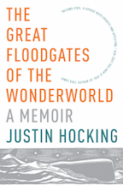
Book Review: The Great Floodgates of the Wonderworld by Justin Hocking
The Great Floodgates of the Wonderworld
A Memoir by Justin Hocking
Graywolf Press, February 2014
ISBN-13: 978-1555976699
$15.00; 266pp.
Reviewed by B.J. Hollars
Part maelstrom, part ebbing tide, part boat-left-adrift-in-the sea, Justin Hocking’s debut memoir refracts life through literature, offering Hocking’s own coming-of-age story in the shadow of Melville’s white whale—at least metaphorically. After the Coloradoan takes a trip to pursue a book contract in New York, he decides to gamble on the faraway land, pulling up roots and heading east for good. Though he expects New York to offer a host of new opportunities, he soon finds himself utterly alone in one of the most densely populated cities in America. Hocking’s long-distance relationship falters, his debts grow, and upon waking one day to find himself working a dead-end job in a windowless room, he begins to reevaluate his life. The only way to alleviate his anxieties is to take refuge in the water (surfing and swimming) or skateboarding in a bowl back on land. As his life rollercoasters, Hocking remains in search of his own metaphorical whale—the panacea for an ennui he feels but cannot name. This dark undercurrent in his own life comes to a head upon learning of a friend’s suicide. Hours after receiving the news, he finds himself swimming “alone at dusk at a beach known for strong rip currents.” Hocking later describes Melville’s own response to receiving equally devastating news about his own friend’s self-inflicted death: “This going mad of a friend or acquaintance comes straight home to every man who feels his soul in him…” Melville said. “For in all of us lodges the same fuel to light the same fire.” It is this “same fuel” that allows Hocking his occasional dramatic indulgence. While readers may not be privy to Hocking’s brand of anxiety, certainly we know some version of it. And it is this fuel, too, that keeps up rooting for him; a man who, like Ahab, throws caution to the wind and dares to dream of capturing the uncapturable.
B.J. Hollars is the author of Thirteen Loops: Race, Violence and the Last Lynching in America, Opening the Doors: The Desegregation of the University of Alabama and the Fight for Civil Rights in Tuscaloosa, and a collection of stories, Sightings. His latest work, a hybrid text entitled Dispatches from the Drownings: Reporting the Fiction of Nonfiction, is forthcoming in the fall of 2014. He teaches at the University of Wisconsin-Eau Claire.

